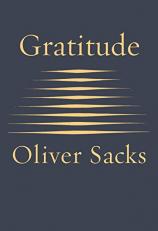Gratitude
Review
Gratitude
A neurologist who gained his greatest renown for his ability to write about his profession in a thoroughly human way, Oliver Sacks passed away in August of 2015. His literary legacy consists of these four short, personal, profound essays written in the last two years of his life as he contemplated the facts of age and dying.
The essays are presented in chronological order, beginning with “Mercury," in which Sacks recounts his love of elements and atomic numbers, allowing him to state “at seventy-nine, I am gold.” He enumerates some of the negative aspects of aging, such as slowing reactions, flagging energies, the tendency to forget names, and the looming fears of “dementia and stroke.” But he can still declare that he’s looking forward to being 80. “My Own Life” was composed after his diagnosis of a recurrence of fatal cancer. Here he cites philosopher David Hume, who wrote, at a similar juncture, “I now reckon upon a speedy dissolution.” He harks back to his attraction to the elements in “My Periodic Table.” He notes that on his desk is a “little lead casket” for his 82nd birthday, wonders if he will live to see bismuth (83), and feels almost sure he will miss the murderously radioactive 84th: polonium.
"[Sacks'] literary legacy consists of these four short, personal, profound essays written in the last two years of his life as he contemplated the facts of age and dying."
In “Sabbath,” the last of the four writings, Sacks recalls growing up in a close-knit orthodox Jewish home, and particularly the rituals of Shabbos: “Kiddush accompanied by sweet red wine and honey cakes…” But this idyllic cultural picture was fractured when Sacks admitted to his father that he had sexual feelings for other boys. His mother shrieked at him, making him hate religion. Leaving home, he struggled with addiction to amphetamines, but later found stability and solace in the work that inspired his book AWAKENINGS.
Thus began a “lonely but deeply satisfying, almost monkish existence.” Sacks devoted himself to the case histories of his and other patients, those whose unique maladies, always presented with respect, even reverence, provided material for popular books like THE MAN WHO MISTOOK HIS WIFE FOR A HAT and SEEING VOICES. Much later, Sacks was inspired by a cousin to visit Israel and then celebrate Sabbath with his orthodox relatives --- “a stopped world, a time outside time.”
In the certainty of approaching death, “Sabbath” concludes with the author’s hope that the “seventh day of one’s life” will bring longed-for peace and rest.
Reviewed by Barbara Bamberger Scott on November 25, 2015
Gratitude
- Publication Date: November 24, 2015
- Genres: Essays, Nonfiction
- Hardcover: 64 pages
- Publisher: Knopf
- ISBN-10: 0451492935
- ISBN-13: 9780451492937





